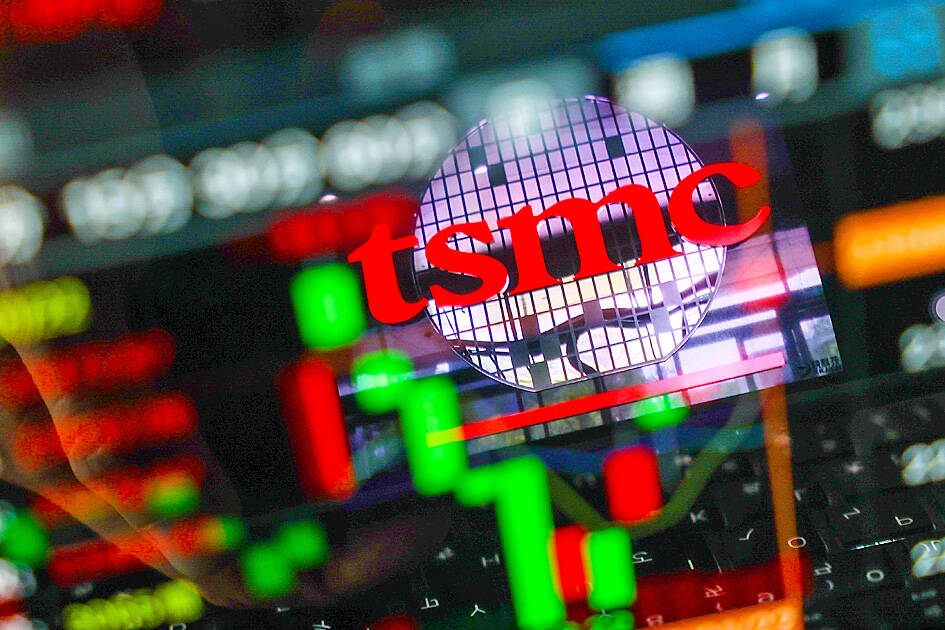An alleged US government plan to encourage Taiwan Semiconductor Manufacturing Co (TSMC) to form a joint venture with Intel to boost US chipmaking would place the Taiwanese foundry giant in a more disadvantageous position than proposed tariffs on imported chips, a semiconductor expert said yesterday.
If TSMC forms a joint venture with its US rival, it faces the risk of technology outflow, said Liu Pei-chen (劉佩真), a researcher at the Taiwan Industry Economics Database of the Taiwan Institute of Economic Research.
A report by international financial services firm Baird said that Asia semiconductor supply chain talks suggest that the US government would ask TSMC to send engineers to Intel’s US fab, applying the company’s know-how to ensure both the fab and subsequent manufacturing projects are viable.

Photo: CNA
Although TSMC has built production facilities in Dresden, Germany, and Kumamoto, Japan, through joint ventures, the local businesses it partners with are its customers, Liu said.
If a joint venture with Intel is formed, it would inevitably focus on advanced semiconductor technology and once technology leaks occur, that could jeopardize TSMC’s leading edge in advanced technology, he said.
As US President Donald Trump is committed to prioritizing US interests, if TSMC cooperates with Intel it might be placed at a disadvantage, he added.
TSMC’s leadership in advanced technology is irreplaceable and gives it strong bargaining power, Liu said, adding that if the US imposes tariffs on imported chips, the increased costs could be passed on to TSMC’s customers in the US.
Therefore, a joint venture with Intel is the worse choice for TSMC and more unfavorable than Trump’s tariff plans, he said.
Intel is facing operational difficulties and is encountering bottlenecks in technological development, while TSMC is in a leading position. If a TSMC-Intel joint venture is formed, it would help Intel overcome difficulties and bolster the development of the US semiconductor manufacturing industry, Liu said.
TSMC chairman C.C. Wei (魏哲家) has said the company has no interest in acquiring Intel’s chip manufacturing facilities after the US firm spun off its foundry business, he said.
Baird analyst Tristan Gerra said that while there is no confirmation and the potential completion of the project could take a long time, the move would make sense, “further building on Intel’s prior CEO’s focus on the company’s core competency, manufacturing.”

Taiwan is stepping up plans to create self-sufficient supply chains for combat drones and increase foreign orders from the US to counter China’s numerical superiority, a defense official said on Saturday. Commenting on condition of anonymity, the official said the nation’s armed forces are in agreement with US Admiral Samuel Paparo’s assessment that Taiwan’s military must be prepared to turn the nation’s waters into a “hellscape” for the Chinese People’s Liberation Army (PLA). Paparo, the commander of the US Indo-Pacific Command, reiterated the concept during a Congressional hearing in Washington on Wednesday. He first coined the term in a security conference last

Prosecutors today declined to say who was questioned regarding alleged forgery on petitions to recall Democratic Progressive Party (DPP) legislators, after Chinese-language media earlier reported that members of the Chinese Nationalist Party (KMT) Youth League were brought in for questioning. The Ministry of Justice Investigation Bureau confirmed that two people had been questioned, but did not disclose any further information about the ongoing investigation. KMT Youth League members Lee Hsiao-liang (李孝亮) and Liu Szu-yin (劉思吟) — who are leading the effort to recall DPP caucus chief executive Rosalia Wu (吳思瑤) and Legislator Wu Pei-yi (吳沛憶) — both posted on Facebook saying: “I

The Ministry of Economic Affairs has fined Taobao NT$1.2 million (US$36,912) for advertisements that exceed its approved business scope, requiring the Chinese e-commerce platform to make corrections in the first half of this year or its license may be revoked. Lawmakers have called for stricter enforcement of Chinese e-commerce platforms and measures to prevent China from laundering its goods through Taiwan in response to US President Donald Trump’s heavy tariffs on China. The Legislative Yuan’s Finance Committee met today to discuss policies to prevent China from dumping goods in Taiwan, inviting government agencies to report. Democratic Progressive Party Legislator Kuo Kuo-wen (郭國文) said

Sung Chien-liang (宋建樑), who led efforts to recall Democratic Progressive Party (DPP) Legislator Lee Kun-cheng (李坤城), was released on bail of NT$80,000 today amid outcry over his decision to wear a Nazi armband to questioning the night before. Sung arrived at the New Taipei District Prosecutors’ Office for questioning in a recall petition forgery case last night wearing a red armband bearing a swastika, carrying a copy of Adolf Hitler’s Mein Kampf and giving a Nazi salute. Sung left the building at 1:15am without the armband and covering the book with his coat. Lee said today that this is a serious